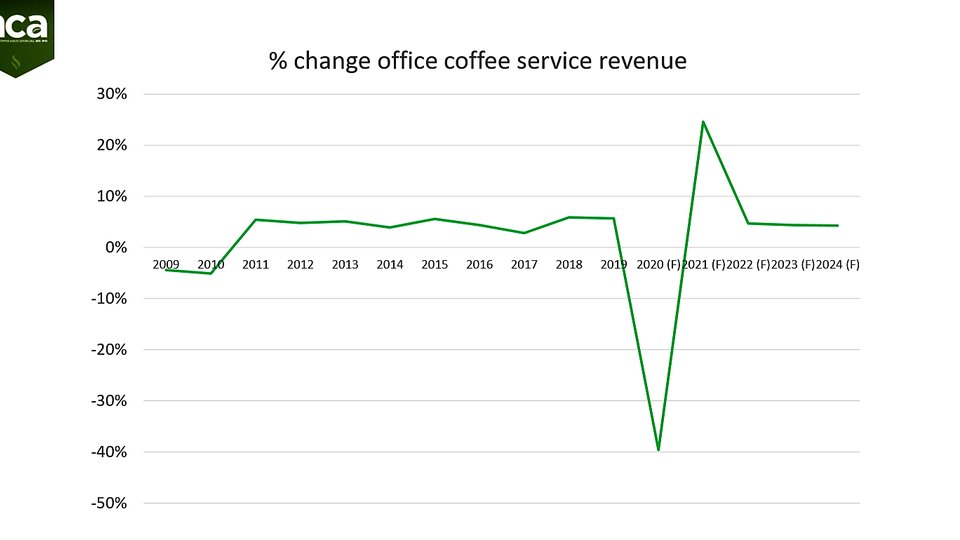Coffee Service
Office coffee service in the age of coronavirus: opportunity exists
Researchers don't believe the OCS market will be recovering from the coronavirus soon. But by understanding new customer needs, operators can recover some of the lost sales, one researcher claims.

July 29, 2020 by Elliot Maras — Editor, Kiosk Marketplace & Vending Times
The COVID-19 pandemic has delivered the greatest setback to the office coffee service industry in the industry's history, with 40% of industry revenue lost, according to a recent survey.
Recovery is not expected for at least a few years, according to The Freedonia Group, a research organization that surveyed U.S. workers in late April and early May. This does not mean that workers are not still drinking coffee, however. OCS operators have opportunities to rebuild their businesses by understanding how customer needs have changed.
Jennifer Mapes-Christ, a senior industry analyst at The Freedonia Group, reviewed the results of the recent study during a webinar presented by the National Coffee Association. The survey covered 1,500 consumers across different regions, age levels and occupations.
Mapes-Christ described new work habits and offered suggestions on how OCS operators can meet changing customer needs.
 |
"The coronavirus has changed the way we work," she said. Close to 60% of employed consumers working from home said they are doing it more than before the coronavirus. Only 17% said they worked from home under normal circumstances.
The current pandemic has had a much more disrupting effect on OCS revenue than the 2009 recession, Mapes-Christ said. Sales fell by a few percentage points during the Great Recession. In 2020, revenue fell by 40%.
The work-from-home trend varies by type of work place, with 68% of urban workers set up to work from home, followed by 63% of suburban workers, 59% of outer suburb workers and 53% of rural workers. Regardless of setting, more workers are set up to work from home than not.
 |
"More urban and suburban workers are part of the knowledge economy and easily work remotely," she said. Another factor is that urban and suburban areas are experiencing more of the coronavirus.
Consumption remains strong
The amount of coffee consumption has not changed, however. On a typical weekday, 99% of respondents drink coffee at home. Where nearly all (97%) drink coffee made at home, nearly two thirds drink coffee outside the home.
"Where the person is working also influences where they get their coffee," she said. More than 90% of workers set up to work from home drink coffee made at home.
People drinking coffee outside the home comprise the traditional market for OCS operators.
"Although people working outside the home are the traditional market for office coffee service, it's worth thinking about a few things," she said. "One, how long will the work-from-home coffee drinker be at home since most of them do not typically do that and are doing so because of their pandemic work adjustments?
"And two, is there a market in reaching out to work-from home coffee drinkers?"
OCS products now less available
In April/May, compared to 2018, fewer employed coffee drinkers had access to coffee products at work, including coffee beans, instant coffee, ground coffee, single-serve coffee and a coffeemaker, Mapes-Christ said.
The exception to this was coffee vending machines. Fifteen-percent of employed coffee drinkers had access to coffee vending machines in 2020 compared to 13% in 2018. Mapes-Christ said vending machines provided a way for employers to shift more of the cost of the coffee to the employees.
Needs unmet at work
The fact that most people who drink coffee at work don't have access to many coffee products at work indicates significant market potential, she said.
Only 29% of employed coffee drinkers had a coffeemaker available at work in 2020 while only 24% had as single-serve brewer available.
While recovery is expected, she said, the OCS industry will not reach 2019 revenue even by 2024. The researcher predicted a 20% spike in revenue by late 2021 before leveling off to the 2019 level.
 |
One growth opportunity is direct-to-consumer sales, she said, including subscription services, mail order sales and delivery to people in their homes.
"Almost all employed coffee drinkers consume coffee in their own home routinely," she said.
Some OCS operators have already tapped this at-home market.
In 2020, Joyride Coffee Distributors launched a direct-to-consumer platform offering delivery of a wide range of coffee products in the lower 48 states, Mapes-Christ said.
The Freedonia survey also showed that for the first time, many consumers are using grocery store curbside pickup, grocery store delivery services, online buying, third party grocery delivery services and food delivery services.
Consumers open to new sources
"Consumers are looking for new ways to get their groceries and they are open to new ways to get other consumables," she said.
The benefit to these options is not only are they conctactless, but they are convenient.
Hygiene concern offers another set of opportunities, Mapes-Christ said. An OCS service will need to provide more frequent cleaning of high touch services and realize that consumers will have more limited access to communal spaces.
The survey also confirmed a high level of concern among consumers about their own safety. The concern was highest among consumers in urban areas, but shared by consumers in all types of environments.
"The pandemic is a personal health concern for most people," she said.
Health and hygiene concerns
Ways to address the hygiene and health concerns include switching to more ready-to-drink containers as well as single-serve units that pour coffee directly into a container.
"Another possibility is to introduce contactless or reduced contact machines," she said. Some systems recently introduced activate dispensing with the wave of a hand. There is also an air touch technology where the user comes close to touching the machine but does not actually touch it.
"Another option is to introduce more coffee stations," she said, adding that work places are grouping workers into smaller "bubbles."
Who are the prospects?
The coffee service market can also be expanded beyond offices to manufacturing sites, warehouses, health care facilities, retail facilities and schools. "Coffee service operators can target non office work environments," she said.
There is also an opportunity to serve "essential" workers who previously worked in unstocked breakrooms.
The coronavirus has caused more people to follow healthier eating habits, creating an opportunity to offer healthier and higher value products, including "superfoods" with immunity boosting capabilities.
Paradoxically, there is also a need for indulgence foods as a reaction to stress.
A majority of respondents said they are eating more indulgence and comfort foods.
A large portion of people drinking coffee at work felt they should not have to pay for coffee at work. This view was particularly prevalent among older workers. Many also felt that coffee helps their work productivity.
OCS expectations not being met
Concerning expectations of OCS, 35% believed coffee they get at work should be better than coffee they normally drink, but only 16% felt this to be the case. Dissatisfaction was highest among older workers.
Consumers are looking for a unique coffee experience, Mapes-Christ said. In addition, younger consumers are more likely to have coffee at lunch rather than just breakfast.
For an update on how the coronavirus is affecting convenient services, click here.
Charts courtesy of the National Coffee Association.
About Elliot Maras
Elliot Maras is the editor of Kiosk Marketplace and Vending Times. He brings three decades covering unattended retail and commercial foodservice.







